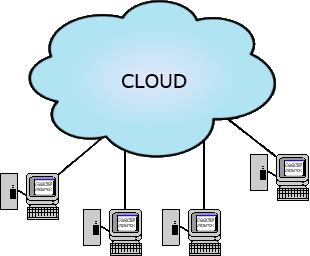In the beginning, all your applications and all your data storage was on your local computer. Then people started connecting computers together into networks. Usually a network would have a server. People used their client computers to access applications and data on the network server. A network might be a local area network (LAN), or a MAN or a WAN.
A MAN being a Metropolitan Area Network, where servers and clients on the network are not in the same building, or nearby buildings, but somewhere in the same metropolitan area, for example in the same city. A WAN being a Wide Area Network, where servers and clients on the network are in a larger geographical area, like a country or continent.

The biggest network of all is the Internet, which spans the globe and potentially reaches into outer space. Devices on the Internet can be accessed by their IP addresses, but an IP address does not specify a geographical location. In fact, you can take a server, with a specific IP address, and move it from one side of the planet to the other, and it would still be accessible by its IP address. In other words, you can't be sure where a specific Internet device is, it's just out there somewhere. It's out there somewhere in the "cloud" of devices that is the Internet.
Now an individual connected to the Internet can use an application such as a database that is located not on their own network, but out in the cloud. An organization can place their data on a storage device that is located not on their own network, but out in the cloud. Many companies have appeared that have computing and/or data storage connected to the cloud that they will provide to anyone, for a price.
Why would an organization want to use services or store their data out in the cloud? There are many reasons:
1. They avoid the cost and time delay of setting up their own networking infrastructure.
2. They avoid the cost of having a large IT department to maintain their own networking infrastructure.
3. They don't need to worry about keeping their applications up to date, protecting their computing services against malware, or maintaining backups of their data.
4. They can very rapidly increase or decrease the amount of computing power and/or data storage that they utilize.
If cloud computing has all these advantages, than why don't all organization adapt it? Well, like everything in this world, there are trade offs. Here are some disadvantages of cloud computing:
1. The actual cost of cloud computing may be higher than a company owned network. Cloud computing providers claim that you get charged only for what you use, but if your company takes a month off and send everybody home and, you still get charged.
2. Even though you avoid the initial cost of network hardware and software, once you pay for that hardware and software, you own it, whereas with cloud computing you continue paying.
3. Are you comfortable having your organizations data out in the cloud, where may different organizations share the same virtual servers, or would you feel more secure keeping your critical data on your own network?
4. Will your cloud service provider give you the level of support you need, or would you get better support having your own in-house IT department?
5. You need communication service to connect to the cloud. If your Internet connection goes down, you are out of business. The weather may be warm and sunny in your area, but if violent weather causes an outage in the area where the cloud servers are located, you are out of business.
Many organizations will opt for hybrid cloud computing. They will maintain an internal network where they can assure maximum security and reliability of mission-critical applications and data, while using some cloud based applications or data storage to take advantage of the scalability of cloud computing services.
More Networking Basics:
• Synchronous, Asynchronous, Isochronous. What Does it Mean?
• What You Need to Know About a Career as a Network Engineer
• Introduction To IP Addressing and Networking
• Degree verses Computer Certifications
• Bluetooth Basics - Bluetooth Technology Tutorial
• Network Servers
• Fiber Optic Cabling For Beginners
• Satellite Broadband Internet Service
• Network Cabling For Beginners
• Networking Foundation Topic - Routing

